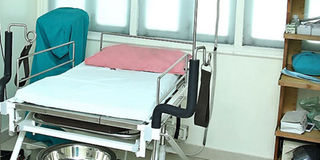Butebo patients cry out over non-functional theatre

For two years, the only theatre at Butebo Health Centre IV has been non-functional, putting patients at risk, mainly mothers in need of Cesarean section, also known as C-section.
What you need to know:
- Mr Chalaire Omagor, the acting Butebo District Education Officer, revealed that out of the required 968 teachers only 729 are on the payroll, leaving a deficit of 249 teachers.
- Butebo has 31 primary schools-all operating under the Universal Primary Education programme with a population [enrolment] of 38,404 pupils.
For two years, the only theatre at Butebo Health Centre IV has been non-functional, putting patients at risk, mainly mothers in need of Cesarean section, also known as C-section.
Patients, especially expectant mothers who need surgical procedure, have two options; to travel more than 30km to the health facilities in the neighbouring Pallisa and Mbale districts or remain in the facility and stare at a non-functional operating room.
A health centre IV is a mini-hospital. It serves a county or a parliamentary constituency. The facility has wards for men, women, and children and should be able to admit patients. It should have a senior medical officer and another doctor as well as a theatre for carrying out emergency operations.
The plight of Butebo residents came to light on Thursday as the district chairman, Mr Sam Keddi, gave his state of council address.
He revealed that the absence of a functional theatre at the health facility has put the expectant mothers at risk of death since emergency operations can not be done at the mini-hospital.
“This remains the biggest challenge to our mothers because they lose their babies or even life since the nearest health facility with a theatre is non-functional. They are forced to travel to Mbale Hospital-approximately 30km away,” Mr Keddi said.
Mr Keddi also told council members that the situation has been compounded by a shortage of ambulances.
The hospital currently uses an ambulance donated by Butebo MP Fred Mudokoyi which is inadequate for the whole district.
The district chairman also noted inadequate accommodation for health workers.
He complained that unscrupulous people were targeting the health facility land.
The district health officer, Dr Nathan Tibakou, acknowledged the challenges.
“Most of the mothers referred to other hospitals lose their babies due to the long distance they travel before being admitted. The reason as to why the theatre is not operating is due to lack of personnel but the district is trying to sort the problem,” Dr Tibakou said.
The doctor also noted that some mothers have shunned going to the hospital for various reasons. This has reduced the number of deliveries at the lower health facilities.
The government constructed theatres at health centre IVs between 1997-2003 with the aim of extending emergency obstetric care services, especially to young mothers and handle minor medical surgeries.
Meanwhile, Mr Keddi told the council that the district is grappling with shortage of primary teachers amid overwhelming number of children enrolled under the Universal Primary Education.
He also cited inadequate office space and insufficient monitoring and supervision among the key challenges crippling the education sector in the district.
Mr Chalaire Omagor, the acting Butebo District Education Officer, revealed that out of the required 968 teachers only 729 are on the payroll, leaving a deficit of 249 teachers.
The district service commission secretary, Mr David Senda, however, told Saturday Monitor that they could not recruit all the teachers needed because of the “meagre resource envelope”.
The district has since recruited 43 primary teachers to cut down on gap.
Butebo has 31 primary schools-all operating under the Universal Primary Education programme with a population [enrolment] of 38,404 pupils. Recruitment of teachers remains one of the government’s key priorities. The upsurge in the enrolment is attributed to free education programme. Currently, there are more than 8 million pupils in schools under the Universal Primary Education programme.



